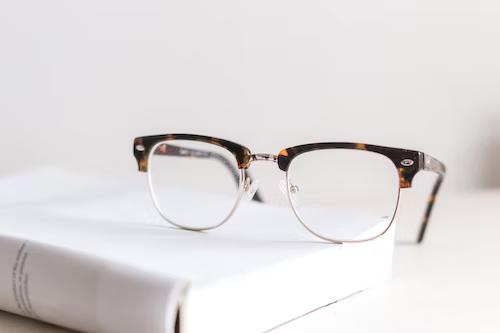Everything about anti fatigue lens you should know
Oct 26 2022

Everyone wearing glasses experiences this at least once in their life: heavy eyelids at the end of the day due to the constant strain from all that screen time. Luckily, there's a type of lens designed to help with this called an anti-fatigue lens.
Anti-fatigue lenses are divided into two portions; the upper portion helps with your far vision, while the lower part makes near vision less straining. This reduces the overall fatigue you experience after a long bout of straining your eyes close-focus.
While that all sounds good on paper, let's take a bit of a deep dive to see if these lenses are even worth buying- or if there's a better place to spend your money.
How Do Anti-Fatigue Lenses Work?
Anti fatigue glasses are mainly used to combat the effects of Visual Fatigue Syndrome or VFS. It is caused by focusing on an object within a distance of 1 to 3 feet away for extended periods of time. The most common symptoms include dry eyes, headaches, eye strain, neck pain, and sensitivity to light.
Is It a Good Investment?
Everyone wants a good bang for their buck whenever they buy something. It's the same when choosing a lens you want. You always want to know whether your investment is worth it. Starting at around $160 with anti-glare and scratch coating, anti fatigue lens price is about three times the price of a standard single-vision lens. They aren't cheap, but are they really worth it?
The answer is definitely yes. Most people in the world spend about 30 years of their life looking at books or screens. Naturally, this makes anti-fatigue lenses seem necessary. Anti-fatigue lenses are designed to alleviate the visual symptoms of eye strain, which can include blurry vision, dry eyes, and headaches. So, wearing anti-fatigue lenses may help to improve your overall comfort and well-being. In addition, the lenses can also help to reduce your risk of developing more serious vision problems in the future. As a result, it may be a wise idea to invest anti fatigue glasses for reading or using digital devices frequently.

Clash of the Lenses- Anti-Fatigue vs Progressive
Progressive, or varifocal lenses, cater to distant, intermediate, and near vision- all in one lens. The lens gives a spectrum of focal power that you can use to focus on whatever distance you're looking at. Progressive lenses are pretty complex compared to anti-fatigue, which is why it takes much longer for the user to acclimatize to them. If you're looking to cop some stylish specs pre-loaded with progressive lenses, try the sleek black Fresno glasses offered by glassesshop.
Anti-fatigue lenses have two major functions: correct distant vision and aid near vision within 30cm in the process. However, they are not meant to correct nearsightedness or farsightedness. They basically relieve the muscular strain that your eyes feel after a long bout of screen time.
Clash of the Lenses- Anti-Fatigue vs Blue Light Blockers
Blue light lenses are an excellent option for people who spend a significant part of their day in front of a screen. Screens are the second largest source of blue light secondary to the Sun. However, they're much closer to us than the Sun- this causes people to be exposed to a very high amount of blue light, which is known to cause eye strain, headaches, and visual fatigue.
Blue light blockers, as the name suggests, block blue light. It filters the blue light emitted from screens by quite a high threshold and essentially helps to reduce eye strain and fatigue, and it can also help to prevent insomnia. In addition, blue light blocker lenses can also help to reduce the risk of macular degeneration, a condition that leads to vision loss.
Anti-fatigue glasses- while not catered towards filtering blue light- yield the same results as blue light blockers. In addition, they decrease eye strain and help to manage headaches. While they don't actively try to reduce eyestrain when using screens, they try to help your eyes focus on objects closer than 30cm, which reduces eyestrain if you're using your phone at night that close.

Do Anti-Fatigue Lenses Actually Help?
Now for the important question: Are these lenses of any use? It turns out the answer is a mixed bag. Depending on your need, it could be yes, or it could be no.
If you're someone who prefers the outdoors or needs lenses that focus on distant vision, you're better off chucking that 3x price tag in the big. However, if you have issues with focusing on near objects or simply suffer from eye fatigue due to your frequent 10-hour gaming sessions and Netflix binges, you might consider anti fatigue glasses for gaming.
Your eye muscles are constantly contracted throughout the day to help you focus, especially up close. Eventually, this leads to burning, itching, and tired eyes- also known as eye strain. Headaches and blurry vision may follow. For this reason, anti-fatigue is a perfect choice. If you're looking for durable and stylish glasses for your brand-new anti-fatigue lenses, shop at Glassesshop and get the best deals, with your first order completely free.
FAQ about Anti Fatigue Lens
1. Which glasses are best to use for computers?
According to research, blue light glasses are the best option for prolonged duration using a computer.
2. Are anti-fatigue lenses the same as bifocals?
No. Bifocals and progressive lenses are for presbyopia who need vision correction. Anti-fatigue lenses prevent eyestrain when doing a task that requires you to focus on an object up close.
3. When should you wear anti-fatigue lenses?
Between the ages of 18-40 years. As for duration, you can wear them all day.
4. Do I need a prescription for anti-fatigue glasses?
No, you do not need a prescription to make anti-fatigue glasses.